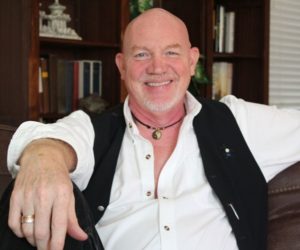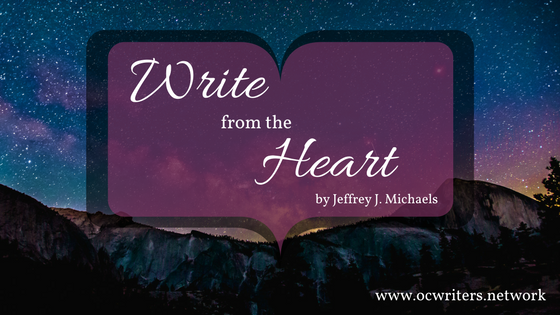by Jeffrey J. Michaels
From whence dost we draw breath?
Sound like a cool quote? I just made it up. Out of thin air, as it were. I respired the words. The thought expired with a question mark. I whispered it to friend conspiratorially. It is an inspiration received. And of course I am heavily intimating that the base of the word “spiros” (which might be Greek or maybe Latin…do I look like a scholar?) is also the basis for the word “spirit.” Not like religion or Caspar the friendly, not Will Eisner’s famous creation, or even 21-year-old Speyside single malt kind of spirit, but rather that intangible element that connects us to something…other. Something that might be us, but is just outside. Something not physical, indefinable but present, and you know it when you sense it. That spirit.
Authors are often asked, “Where do you get your crazy ideas?” Many have a silly answer, some pithy, some wise and wonderful. The illusion is that they arrive unbidden, communique sent from above (or below in the case of horror writers) and that may be true. The truth is, more often than not, we conjure them like mediums claim to call spirits.
An Alchemical Reaction
Inspiration is an alchemical reaction to input from our entire lives. We gain ideas from a vast mix of previously experienced words and images starting from before birth. What did mom and dad talk about after you were conceived? Those are the first words that have an effect on you, albeit perhaps a very minimal one. As creatives we take the leaden, commonplace communications and spin them into golden prose.
Reality time. Let us consider the fact that writers often are primarily inspired to write by other writers, other books, other stories told in various mediums. Not the kind of mediums that conjure sprits, but cinema, radio, poetry, or even music. Anything that tells a story we can access mentally and emotionally.
During an interview, I once asked science fiction/ fantasy author Gene Wolfe what question he was tired of getting when being interviewed. He said, “Where do you get you crazy ideas?” I then casually folded my notes over so that he could not see that my next question was just that.
There is No Shortcut
Once upon a time, I was young enough to believe that if an author I admired told me their secret source of inspiration, perhaps I too could become a masterful creative artiste like my literary idols. You can’t. There is no shortcut. You cannot walk another person’s path and reproduce their artistic success.
Often what a writer will do is follow someone else’s formula and produce some very similar version of their product. There is nothing wrong with doing this, and it is a fine way of making money. But, if you are going for high-concept bold innovation and stunning creativity you must tap into your own connection to the universe. The universe itself is a creative energy and it is amazingly diverse in what it is accomplishing. In fact I tell people that the universe does not support conformity, rather it encourages diversity in all aspects of itself.
You can feed your creative fire. You can seed the fields of your heart and brain with fertile and vital energies in the form of words and thoughts and familiar stories told in unique ways and unique stories told in familiar ways. Of course you must till the soil, weed the crop, harvest and thresh the ripened yield, and if all that sounds like hard work, you are correct. Getting the crazy idea for the story is often the easiest part, especially if you become adept at being open to inspiration.
The Secret
Here is the secret. It is worth the effort. After a field is gleaned, the community has food that nourishes and allows folks to survive and flourish. It is the same with stories. Stories feed us and feed our spirit. Humanity and the future are offered an opportunity to grow and evolve through the perpetual creation of stories told in whatever manner you, the author/creator doth choose.
And the other part of the secret? As one farmer’s crop is essentially the same as another’s, your book, song, or film is always a story that has been told before. It is only a new twist or style or rhythm that makes it seem fresh. While new recipes and combinations can help us enjoy the same old foods, there is something comforting in a meal made the same way your mother made it and her mother before. But she probably tweaked the recipe somewhere down the line.
Read Good Writing
Mister Wolfe also told me that if I wanted to become a good writer, I need read good writing. I pass that advice on to you in the hope that one day I will be reading your excellent and inspired storytelling.
Below I have included some lists of what I consider to be inspirational books for authors.
Inspirational Books about Writing
- On Writing by Stephen King – The best book King ever wrote, just don’t take everything he says as an absolute. Styles shift and alter. Few things are etched in stone.
- Bird by Bird by Anne Lamott – Sometimes referred to as an instruction manual, this is a clever, witty, and deeply insightful book, filled with lessons disguised as entertainment wrapped in skilled examples of fine writing.
- Stealing Fire from the Gods by James Bonnet – A treatise on the nature of STORY; absolutely essential for those who are seeking a deeper understanding of the nature and purpose of storytelling. Read this book before you sign up for any expensive writing course.
- Write Your Novel from the Middle by James Scott Bell – Easy and brief with excellent observations about avoiding the muddle in the middle by starting there. More or less. For Pantsers and Plotters alike.
- The First Five Pages by Noah Lukeman – Another one that gets quoted a lot BUT…read it yourself and take away the principles and leave the rigid rules behind.
- Save the Cat by Blake Snyder – Really more of a book about filmmaking and screenwriting, but the principles apply to all storytelling mediums. The late Blake Snyder’s Beat Sheets changed the world of writing.
Fiction That Will Inspire You to Be a Better Writer
- Tarzan of the Apes – An unexpected and literate story well told. Pure raw creativity.
- Replay by Ken Grimwood – A metaphysical treatise on free will, choice, and destiny all told in an entertaining manner. Deeply, spiritually meaningful without sermonizing.
- Time and Again by Jack Finney – An atypical Time Travel story. The characters drive the tale.
- Eva Luna/The Stories of Eva Luna by Isabel Allende – The first book is the life of a writer from birth, while the second are the stories she writes allowing us to see how they are influenced and informed by her life as we witnessed in the first volume.
- Swordspoint by Ellen Kushner – World Building, Character Arcs, and Romance all wrapped in a Fantasy style tale without many fantasy Tropes.
- M*A*S*H by Richard Hooker – Satire by episode and ensemble cast on the nature of war and the sense of insanity well communicated through madcap humor. Concise and sharp. It might be sacrilege to suggest this book is better than Catch 22 by Heller, so I will not.
- If On A Winter’s Night A Traveler by Italo Calvino – A truly meta construct of a novel.
- Always Coming Home by Ursula K. LeGuin – Indescribably beautiful collection of interconnected stories, poems, notes, and more. A unique reading experience.
- Soldier in the Mist by Gene Wolfe – A brilliant twist on the unreliable narrator before anyone knew there was such a thing. Note: The phrase “a brilliant twist” can be applied to most all of Wolfe’s writing. Read Gene Wolfe. Right now.
- Neverwhere by Neil Gaiman – I could just as easily said Stardust or the “Sandman” graphic novel series, but this one is the most accessible and remains one of the more brilliant ideas and interpretations of Gaiman’s particularly poetic style. For absolute riotous fun also read Good Omens co-written by Neil with Terry Pratchett.
Classics That Inspired Everything Being Written Today
- Frankenstein by Mary Shelley – The mother of modern science fiction. Structure of Flashback
- Dracula by Bram Stoker – The father of modern horror and suspense. Structure of Letter writing
- The Time Machine/War of the Worlds by H.G. Wells – The father of modern Science Fiction. Social ideas expressed in riveting tales of suspense and wonder
- Hamlet by William Shakespeare – Dialogue and Quotable lines! Shakespeare gave us modern English.
- 20,000 Leagues Under the Sea by Jules Verne – The father of modern adventure and fantastic fiction. Thousands of ideas within just one novel. The Mysterious Island invented the modern sequel. For better or worse.
- Huckleberry Finn by Mark Twain – The “father of American Literature” claims Wm. Faulkner and who am I to disagree? Hemingway said Huckleberry Finn was the source of all American literature, hence my choice of titles, but, like Gene Wolfe, just read Twain, any and all. You will grow as a writer. FWIW my personal fave is The Mysterious Stranger.
- The King of Elfland’s Daughter by Lord Dunsany – Pure fantasy and superior prose.
- The Man Who Would Be King by Rudyard Kipling – A short story with great power. I almost chose Puck of Pook’s Hill which, if you are a fantasy writer, you should read immediately. We are all fantasy writers by the way. “An immense gift for using words,” T.S. Eliot said of Kipling, adding that he was, “a writer impossible wholly to understand and quite impossible to belittle.” Like Twain and Wolfe, reading Kipling is a lesson that will guarantee growth and increased skill for a writer.
***

Jeffrey J Michaels, Author
Jeffrey J. Michaels is a Gemini. As such he is deeply involved in whatever interests him at the moment. His describes his book A Day at the Beach and Other Brief Diversions as “metaphyictional,” combining fantasy and humor with metaphysical elements. He is currently polishing a sweeping fantasy series of interconnected tales collectively known as The Mystical Histories. It is varied enough that he says he may even finish most of the stories. In his real life he is a well-respected creative and spiritual consultant. He does not like to talk about his award winning horror story. www.jeffreyjmichaels.com



